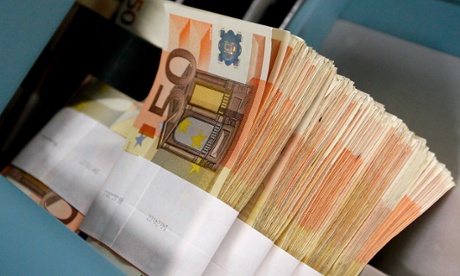
The euro fell and stockmarkets jumped after European Central Bank chief Mario Draghi stunned traders with a bigger than expected €1.1bn stimulus package for the eurozoneon Thursday.
European government borrowing rates also plummeted to record lows after Draghi said a programme of quantitative easing (QE) worth €60bn a month would start in March and last until at least next September or when inflation returned to near its 2% target.
The FTSE rose 68 points to 6796 while continental stockmarkets were buoyed with the French Cac hitting 4552, up 1.5%. The FTSEurofirst 300 index of top European shares hit a seven-year high.
On the currency markets, the euro hit an 11-year low of $1.1404. Against the pound it hit €1.32.
David Owen, chief European economist at Jefferies International, said the unlimited nature of the commitment by the ECB had impressed the markets.
“This is open-ended QE; and fundamentally the key message that Draghi will want the markets to take away from today.”
David Keeble, global head of interest rates at Credit Agricole in New York, said: “He took out the bazooka. It is a big and credible programme.”
Draghi, who two years ago said he would do whatever it takes to save the euro, has come under pressure for more than a year to act on his promise.
Previous purchases of eurozone debt by the ECB have swelled its balance sheet to almost €2 trillion, but this failed to prevent the currency bloc’s recovery from stalling and the region falling into deflation last month.
Analysts were shocked earlier this month when official figures revealed that prices fell in December for the first time since the banking crisis, tumbling -0.2%.
Some analysts said the scale of the package meant the euro could reach parity with the dollar later in the year.
Draghi said pushing down the value of the euro was not a policy target for the ECB, but analysts have long argued that a fall in the value of the currency, especially against the dollar, would have a positive impact on eurozone exports, boosting growth by making them cheaper.
A further decline in the euro, which has crashed by almost 20% against the dollar since last spring, will raise the cost of imports, helping to push inflation back towards the ECB target.
During a frenzied day of trading following the early afternoon announcement, the euro fell more than 1% against the dollar, the yen and the Swiss franc.
The impact was also felt in bond markets. Spanish and Italian 10-year bond yields fell by more than 10 basis points to new record lows of 1.402 percent and 1.557 percent respectively.
German 10-year Bund yields, which set the standard for eurozone borrowing costs, hit a new low of 0.377%, down from 0.53% before Draghi spoke. Stockmarkets cheered the prospect of cheaper borrowing costs triggered by the ECB move, sending Germany’s Dax to a record high, before it pared some gains. Spain’s Ibex rose 1.8% while Italy’s MIB index climbed 2.4%.
Draghi said the quantitative easing programme would include purchases of bonds with maturities of up to 30 years. Italian 30-year yields, which reflect the interest rate paid by national governments, fell below 3% for the first time, while France’s dropped below 1.5%.
“The ECB delivered more than I was expecting, in terms of size especially. It is a pretty powerful package, it is serious medicine,” said Andrew Bosomworth, a senior portfolio manager at Pimco, the world’s largest bond investor.
He said investors faced with ultra low returns in the bond markets would seek out equities, driving stock markets back towards peaks last reached in the dotcom boom of the late 1990s.
The ECB will mainly buy investment-grade debt, but junk-rated bonds issued by Greece and Portugal, which are still re-financing their debts inside the EU’s bailout scheme, will also be included.
Brussels policymakers hope the inclusion of low grade Greek bonds will increase the pressure on Athens to stick to the bailout deal after this weekend’s snap elections. The vote looks likely to be won by the far-left Syriza party, which promises an end to austerity and win concessions from Brussels following a renegotiation of Athens’s debt to official lenders.
Greek 10-year yields were down 13 basis points at 9.38%. Greek Prime Minister Antonis Samaras hailed the QE launch and warned his country must complete the stalled bailout review to take advantage from it.

